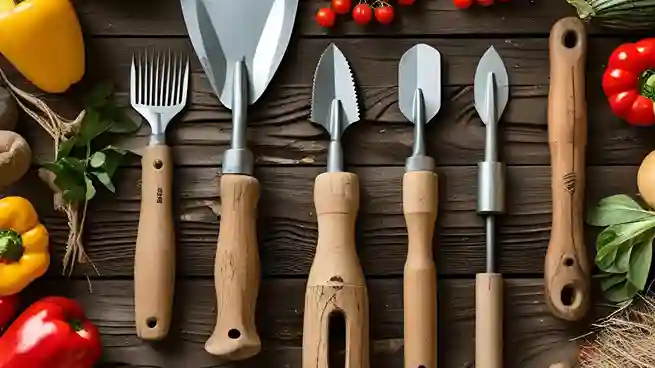Small Farm Tools play a vital role in creating efficient and happy harvests. Without the right tools, farming often becomes slow, tiring, and less productive. These tools help farmers save precious time, reduce physical strain, and protect crop health. By choosing the correct equipment, even a small farm can enjoy better yields and sustainable growth. Whether it’s preparing soil, watering crops, or collecting harvests, reliable tools make every step easier and more rewarding.
Hand Tools Every Farmer Needs
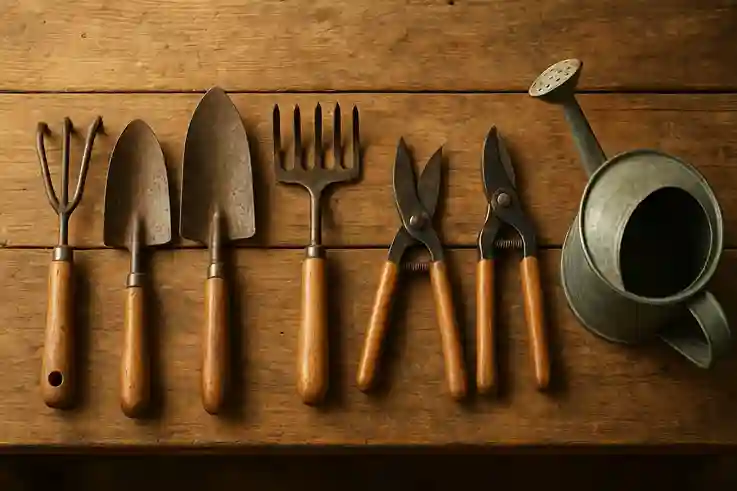
Hand Small Farm Tools form the core of daily farm work. These tools may look simple, but they decide how easy and effective tasks become.
- A hoe is a must-have for weed control. It slices through weeds quickly and keeps rows clean. With regular use, hoes reduce the need for chemicals and protect soil health.
- A spade works for digging, turning soil, and planting. Its strong blade breaks tough ground and improves soil aeration. Spades also help with transplanting seedlings safely without harming roots.
- A rake is more than a tool for clearing debris. It levels soil before planting and spreads compost evenly. This ensures seeds settle well and crops grow in straight rows.
- Pruners keep plants healthy by removing dead stems and damaged leaves. Clean cuts encourage new growth and protect crops from pests. Sharp pruners also make harvesting fruits and vegetables easier.
Together, these hand Small Farm Tools save time, reduce effort, and boost productivity. They form the foundation of farming success, from preparing soil to gathering harvests.
Soil Preparation Tools for Healthy Growth
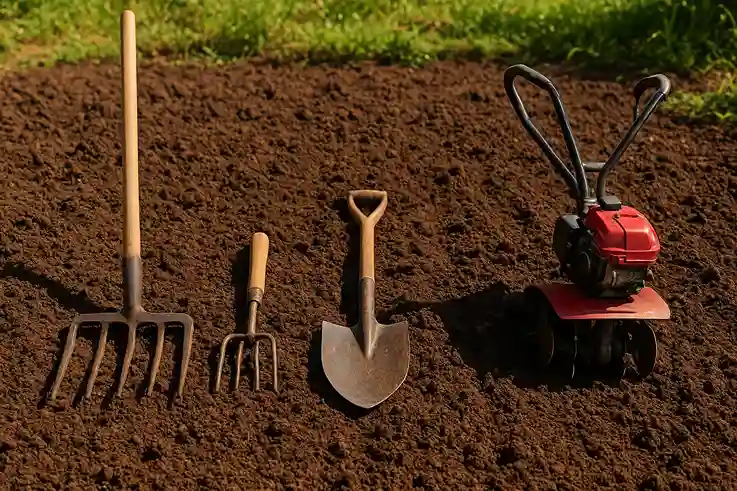
Healthy soil is the base of every strong harvest. Without good soil preparation, even quality seeds may fail. Small Farm Tools designed for soil work improve structure, aeration, and fertility. They make planting easier and crops healthier.
Tillers for Breaking Ground
Tillers are powerful Small Farm Tools that prepare land for planting. They cut through compact soil and turn it into loose, workable ground. This helps seeds settle evenly and sprout with less struggle.
By breaking hard clumps into fine particles, tillers create better root pathways. Strong roots mean stronger plants and healthier harvests. A tiller also mixes compost or organic matter directly into the soil. This enriches the ground with nutrients and improves fertility over time. Farmers with larger plots often choose motorized tillers for speed and efficiency. On smaller farms, lightweight tillers or manual versions work well without causing soil damage. With the right tiller, soil preparation becomes faster, easier, and far more effective.
Broadforks for Deep Aeration
A broadfork is one of the most valuable Small Farm Tools for natural soil care. Unlike machines that churn and disrupt layers, the broadfork preserves the soil’s natural structure. By gently lifting and loosening deep sections, it allows oxygen, water, and nutrients to move freely underground. Better airflow means roots grow stronger and deeper. Improved drainage prevents waterlogging, which often harms young plants. The broadfork also supports soil organisms like worms and microbes. These living helpers keep soil fertile without chemical input.
Farmers prefer broadforks because they balance efficiency with sustainability. They require human effort but cause little long-term damage. With regular use, this simple tool ensures healthier soil and stronger harvests year after year.
Hand Cultivators for Daily Care
Hand cultivators are versatile Small Farm Tools designed for close, detailed soil work. They fit perfectly into smaller plots, raised beds, and garden rows where larger tools may be difficult to use. By loosening the top layer of soil, hand cultivators improve water penetration and keep the ground from hardening. This allows roots to absorb moisture more effectively during dry periods. They also remove surface weeds before they compete with crops for nutrients.
Because they are lightweight and easy to control, hand cultivators are ideal for regular maintenance. Farmers use them between planting and harvesting to keep soil healthy and crops strong. With consistent use, this tool helps create fertile ground season after season.
Strong soil preparation with the right Small Farm Tools ensures higher yields, stronger plants, and long-lasting soil health.
Watering Tools That Save Time and Effort
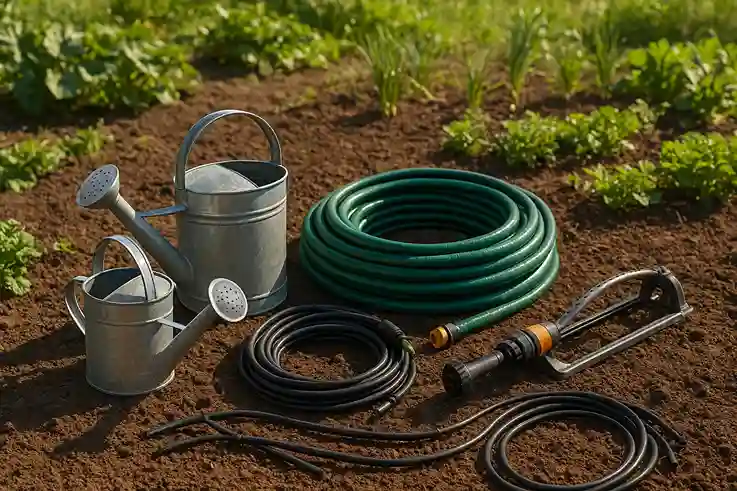
Watering is one of the most important daily tasks on any farm. The right Small Farm Tools for irrigation save time, reduce waste, and protect crops from stress. Efficient watering methods also support long-term soil health and conserve precious resources.
Watering Cans for Precision
Watering cans are classic Small Farm Tools that never lose their value. They are lightweight, simple to use, and perfect for small plots or container gardens. Farmers often rely on them when working with delicate seedlings or newly transplanted crops.
The main advantage of watering cans is control. They allow water to be delivered exactly where roots need it, without flooding surrounding soil.
. This prevents waste and protects tender plants from overwatering. Different spout designs add flexibility. A fine rose attachment creates a gentle shower, while a narrow spout directs water into deeper soil pockets. With proper use, watering cans become reliable tools for careful, precise irrigation
Hoses for Flexibility
Garden hoses are simple yet powerful Small Farm Tools for everyday irrigation. They provide quick access to water and cover larger areas in less time than manual methods. A hose also reaches corners and rows that may be difficult for watering cans or fixed systems to handle. The biggest advantage of hoses is versatility. With the right nozzle, a hose can switch between a fine spray for tender seedlings and a stronger flow for established crops. Farmers can adapt water pressure and pattern to suit different plant needs.
Durability also matters. High-quality hoses resist kinks and last longer under constant use. Lightweight versions are easier to carry, while reinforced hoses handle heavy-duty tasks. For small farms, a reliable hose is often the bridge between efficiency and crop health.
Drip Systems for Conservation
Drip irrigation is one of the most efficient Small Farm Tools for water management. Instead of spraying or flooding soil, it delivers water slowly and directly to plant roots through narrow tubes or emitters. This method keeps the root zone moist while leaving the surrounding soil dry.
The biggest advantage of drip systems is conservation. Because water goes straight to the roots, there is little evaporation or runoff. Farmers save significant amounts of water, which is critical in dry regions or during drought. Drip irrigation also supports healthier plants. Consistent moisture at the root level reduces stress, prevents diseases linked to wet leaves, and improves crop yields. Many systems can even deliver liquid fertilizers alongside water, boosting efficiency further.
Although installation requires planning, drip systems quickly repay the effort with long-term savings and improved harvest quality. For small farms focused on sustainability, they are one of the smartest investments available.
Sprinklers for Broad Coverage
Sprinklers are reliable Small Farm Tools for irrigating wide fields and densely planted areas. They distribute water evenly, making them especially useful for crops that need consistent moisture across large spaces. By spraying in a circular or rectangular pattern, sprinklers ensure no row is left dry.
One of their biggest advantages is labor savings. Instead of carrying cans or dragging hoses, farmers can water entire plots at once. Modern sprinklers even allow adjustments in spray distance and angle, helping match water delivery to specific crop needs. Timed sprinklers add another layer of efficiency. By setting schedules, farmers can water early in the morning or late in the evening, when evaporation rates are lower. This not only conserves water but also reduces plant stress.
While sprinklers may use more water than drip systems, they remain an essential choice for covering larger areas quickly and with minimal effort.
By combining these watering tools, farmers can balance precision and efficiency. The right choice depends on farm size, crop type, and water availability, but all help conserve resources while ensuring strong, healthy harvests.
Comparison of Watering Small Farm Tools
| Tool | Best Use | Pros | Cons |
|---|---|---|---|
| Watering Can | Small plots, seedlings, pots | Precise, gentle, low cost | Time-consuming for larger areas |
| Garden Hose | Medium plots, flexible watering | Versatile, adjustable spray, easy setup | Can waste water if overused |
| Drip System | Root-level irrigation, dry areas | Saves water, reduces disease, efficient | Higher setup cost, maintenance needed |
| Sprinkler | Large fields, broad coverage | Even watering, time-saving, automated use | Less efficient, more evaporation |
Harvesting Tools for Faster Collection
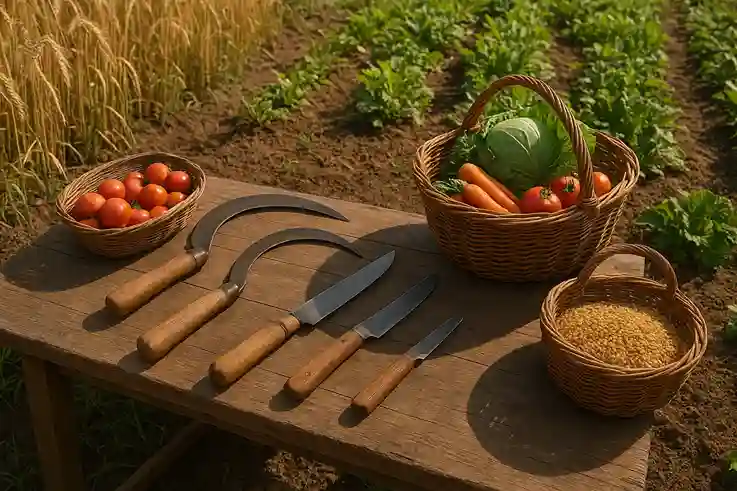
Harvesting is the most rewarding stage of farming, but it can also be demanding. The right Small Farm Tools make collection faster, safer, and more efficient. By reducing damage to crops, these tools help farmers maximize yield and quality.
Sickles for Quick Cutting
Sickles are among the most essential Small Farm Tools for harvesting. Their curved blades allow farmers to cut stems quickly and efficiently. This makes them ideal for grains, leafy vegetables, and herbs that require gentle handling. Using a sickle properly helps minimize crop damage. The sharp, precise blade reduces tearing or crushing, which protects both yield and quality.
For small plots, sickles are lightweight and easy to maneuver, allowing farmers to work in tight spaces without tiring.
Regular maintenance, like sharpening the blade and cleaning after use, keeps the sickle effective for years. When combined with other harvesting tools, sickles help ensure faster collection and healthier crops from field to storage.
Scythes for Larger Fields
Scythes are sturdy Small Farm Tools designed for cutting larger areas efficiently. Their long, curved blades allow farmers to clear wide fields in smooth, continuous swings. This makes them ideal for tall grasses, grains, or plants that grow in dense patches. Compared to sickles, scythes cover more ground with less effort. They help preserve stalks and prevent unnecessary crushing, which protects crop quality. Proper technique is important—using a steady rhythm reduces fatigue and ensures clean cuts.
Maintenance also extends a scythe’s effectiveness. Sharpening the blade regularly and keeping the handle sturdy ensures it works safely season after season. For medium to large plots, scythes save time while maintaining the integrity of harvested crops.
Harvest Knives for Precision
Harvest knives are essential Small Farm Tools for handling delicate crops. Their sharp, precise blades allow farmers to cut fruits, vegetables, and soft-stemmed plants cleanly, minimizing bruising or damage. Using a harvest knife properly ensures that produce retains its freshness and quality, which is crucial for storage or selling at the market. These tools are lightweight, easy to handle, and ideal for targeted harvesting in tight spaces or crowded rows.
Regular blade maintenance, including sharpening and cleaning, keeps the knife efficient and hygienic. By combining harvest knives with other tools like baskets or sickles, farmers can speed up collection while keeping crops in top condition from field to storage.
Baskets for Safe Handling
Baskets are simple yet vital Small Farm Tools for harvesting. They provide a safe way to collect and carry crops without causing damage. Unlike sacks or piles, baskets prevent crushing and bruising, preserving the quality of fruits, vegetables, and herbs. Breathable designs allow air to circulate, reducing moisture buildup and slowing spoilage. This keeps produce fresher for longer, whether for storage or market delivery. Baskets also make transport easier, letting farmers carry multiple items efficiently across fields.
Durable materials, like woven reeds or lightweight plastics, ensure baskets last through repeated harvests. When combined with sickles, scythes, and harvest knives, baskets complete a harvesting toolkit that maximizes yield, quality, and efficiency.
Comparison of Harvesting Small Farm Tools
| Tool | Best Use | Pros | Cons |
|---|---|---|---|
| Sickle | Small plots, grains, leafy crops | Lightweight, precise, easy for tight spaces | Slower on large fields |
| Scythe | Medium to large fields, tall plants | Covers large areas quickly, preserves stalks | Requires skill and practice |
| Harvest Knife | Delicate crops like fruits and vegetables | Clean cuts, prevents bruising, maintains freshness | Small coverage, repetitive use tiring |
| Baskets | Collecting and transporting crops | Protects produce, breathable, durable | Does not cut or trim crops |
Storage and Maintenance Tools for Longevity
Proper care and storage of Small Farm Tools are essential for long-term efficiency. Well-maintained tools last longer, work better, and protect crops from accidental damage. Investing time in storage and maintenance directly improves harvest results.
Tool Sheds for Organized Storage
A dedicated tool shed is one of the most important Small Farm Tools for protecting your equipment. It shields tools from rain, sun, pests, and rust, which can shorten their lifespan. Proper organization inside the shed prevents misplacement and makes it easy to locate the right tool quickly.
Even a small shed, if well-planned, improves efficiency. Shelves, hooks, and labeled sections keep tools accessible and prevent accidents from cluttered workspaces. With everything in its place, daily farm tasks become faster and smoother, letting farmers focus on soil, crops, and harvests instead of searching for tools. Regularly checking the shed for leaks, pests, and wear ensures that Small Farm Tools remain in top condition year-round. A well-maintained shed supports long-term productivity and healthier harvests.
Sharpening Kits for Peak Performance
Blades on sickles, scythes, and harvest knives are only as effective as their edges. Small Farm Tools require regular sharpening to maintain efficiency and safety. A good sharpening kit—containing files, whetstones, or honing rods—keeps blades clean and sharp. Sharp tools reduce the physical effort needed during cutting, slicing, or pruning. They also prevent accidental damage to crops, ensuring clean, precise cuts that promote plant health. Dull blades can crush stems or bruise produce, lowering overall harvest quality.
Farmers who schedule routine sharpening save time and reduce frustration during busy harvest periods. Investing in a sharpening kit ensures that Small Farm Tools perform at their best season after season, supporting both safety and yield.
Protective Gear for Safe Handling
Gloves, boots, and protective clothing are essential Small Farm Tools for the farmer themselves. They prevent injuries while using sharp or heavy equipment. Comfortable gear also reduces fatigue, allowing longer, more productive work sessions.
Regular storage and maintenance routines help tools perform at their best. Farmers who invest in care see faster, safer, and higher-quality harvests season after season.
Comparison of Storage and Maintenance Small Farm Tools
| Tool | Best Use | Pros | Cons |
|---|---|---|---|
| Tool Shed | Storing all tools safely | Protects from weather, rust, pests; organized | Requires space and setup cost |
| Sharpening Kit | Maintaining cutting edges | Keeps tools sharp, reduces effort, prevents crop damage | Requires regular use and skill |
| Protective Gear | Farmer safety during work | Prevents injuries, reduces fatigue, improves efficiency | Does not directly improve tool performance |
Tips for Choosing the Right Small Farm Tools
Selecting the right Small Farm Tools can make farming easier, faster, and more productive. The right tools depend on your farm’s size, soil type, and the crops you grow.
Match Tools to Farm Size
Small plots thrive with lightweight, manual Small Farm Tools. Hand cultivators, watering cans, and sickles are easy to handle in tight spaces and allow precise care of crops. They reduce strain and make detailed tasks like weeding, planting, or harvesting more manageable.
Larger fields, however, demand more robust tools. Scythes, hoses, and small mechanized equipment help cover wider areas quickly and efficiently. Choosing tools suited to the farm’s size prevents wasted effort, speeds up daily chores, and ensures crops receive proper care without overworking the farmer. Selecting the right tools for the scale of your farm is the first step toward smarter, more productive farming.
Consider Soil Type
Soil type plays a crucial role in choosing the right Small Farm Tools. Heavy clay soils are dense and compact, so strong spades, tillers, or broadforks are needed to break and aerate the ground effectively. Loamy soils, being more balanced, respond well to most standard tools, while sandy soils are loose and easier to work with, making lightweight hand tools ideal. Matching tools to the soil not only reduces physical strain but also improves soil structure, encourages root growth, and supports healthier, more productive crops.
Select for Crop Variety
Different crops demand specific care, making the choice of Small Farm Tools essential. Leafy greens and tender herbs benefit from hand cultivators, watering cans, and precise harvesting knives to avoid damage. Fruits and soft vegetables thrive when collected with sharp knives and breathable baskets, which prevent bruising and preserve freshness. Grains and tougher crops can be efficiently harvested with sickles or scythes, saving time while protecting stalk quality. By selecting tools suited to each crop type, farmers can maximize yield, reduce waste, and maintain the health and quality of their harvest.
Invest in Durability and Multipurpose Tools
Durable Small Farm Tools are an investment that pays off over time. High-quality materials and solid construction ensure tools perform consistently season after season, reducing the need for frequent replacements. Multipurpose tools, such as adjustable hoes or combination pruning knives, let farmers complete several tasks with a single tool, saving both time and storage space. Using durable, versatile equipment also reduces physical effort, minimizes the risk of crop damage, and supports a smoother, more productive workflow. Ultimately, quality tools contribute directly to healthier plants and higher yields, making them essential for any small farm.
By choosing Small Farm Tools thoughtfully, farmers can work smarter, protect crops, and enjoy higher yields with less strain.
FAQs on Small Farm Tools
Conclusion on Small Farm Tools
Small Farm Tools are the backbone of efficient, productive, and enjoyable farming. From hand cultivators and watering cans to sickles, scythes, and baskets, each tool plays a vital role in planting, maintaining, and harvesting crops. Proper selection, maintenance, and storage ensure tools perform at their best, reduce physical strain, and protect both plants and farmers.
Investing in durable, multipurpose tools tailored to your farm size, soil type, and crop variety leads to healthier plants, higher yields, and happier harvests. By using the right Small Farm Tools thoughtfully, even small farms can operate efficiently and sustainably.
Start small, maintain your equipment, and watch your farm thrive.
Share your favorite Small Farm Tools or tips in the comments below to help other farmers achieve better, happier harvests.

Silvia Heart is a lifestyle and wellness writer with a background in apparel and a degree in fashion. She blends creativity with practical insights, guiding readers toward intentional, balanced living. Through her approachable style and thoughtful storytelling, Silvia inspires her community to embrace both everyday joy and personal growth.
